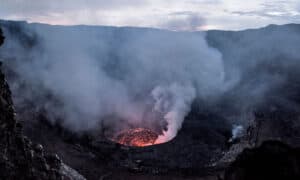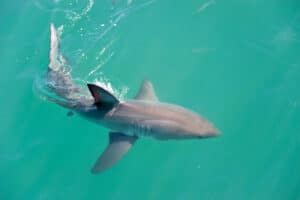Key Points:
- Great white sharks are apex predators as they are at the top of the food chain in the ocean. They can grow to 20 feet long, with females averaging 15-16 feet and males typically 11-13 feet.
- The average lifespan of a great white shark is 40 to 70 years of age. Until 2014, experts thought that great white sharks only lived for 25 to 30 years.
- Factors that can impact the great white’s lifespan are overfishing by humans, being preyed upon by killer whales, and their habitats being affected by climate change, pollution, or development.
Great white sharks are the world’s largest predatory fish. Most of us are familiar with this specific shark thanks to movies such as Steven Spielberg’s Jaws. When many people mention being afraid of swimming in deep waters, it’s often because of sharks. However, great white shark attacks are actually not as frequent as one might think.
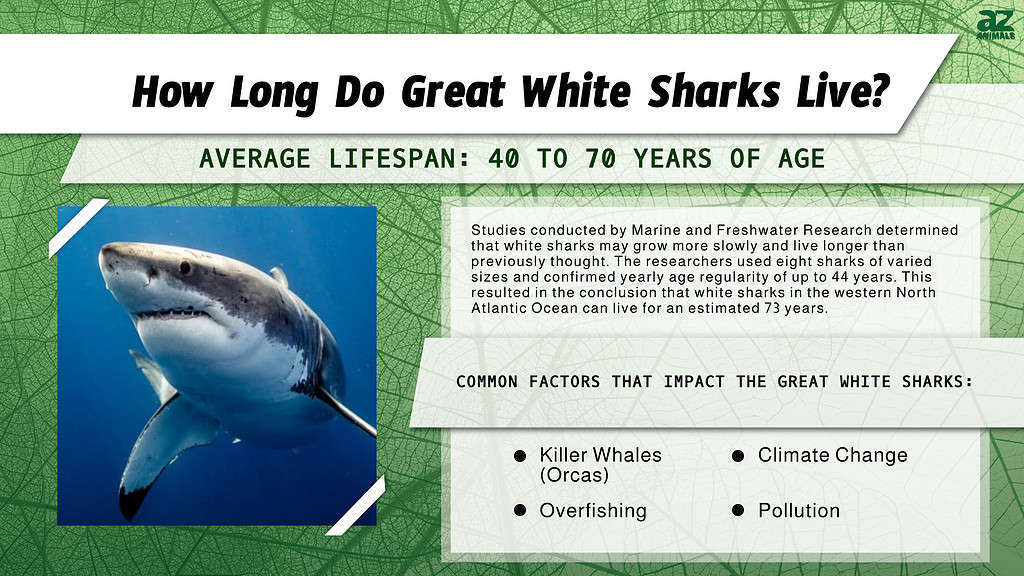
Still, despite all the fear surrounding this dangerous hunter, the great white shark is a fascinating creature. Have you always been interested in learning more about this beast of prey? How long do great white sharks live? In this article, we’ll give you the rundown of this massive hunter along with details on the great white shark’s lifespan and life cycle. Let’s uncover what makes this shark so great!
The Rundown on Great White Sharks
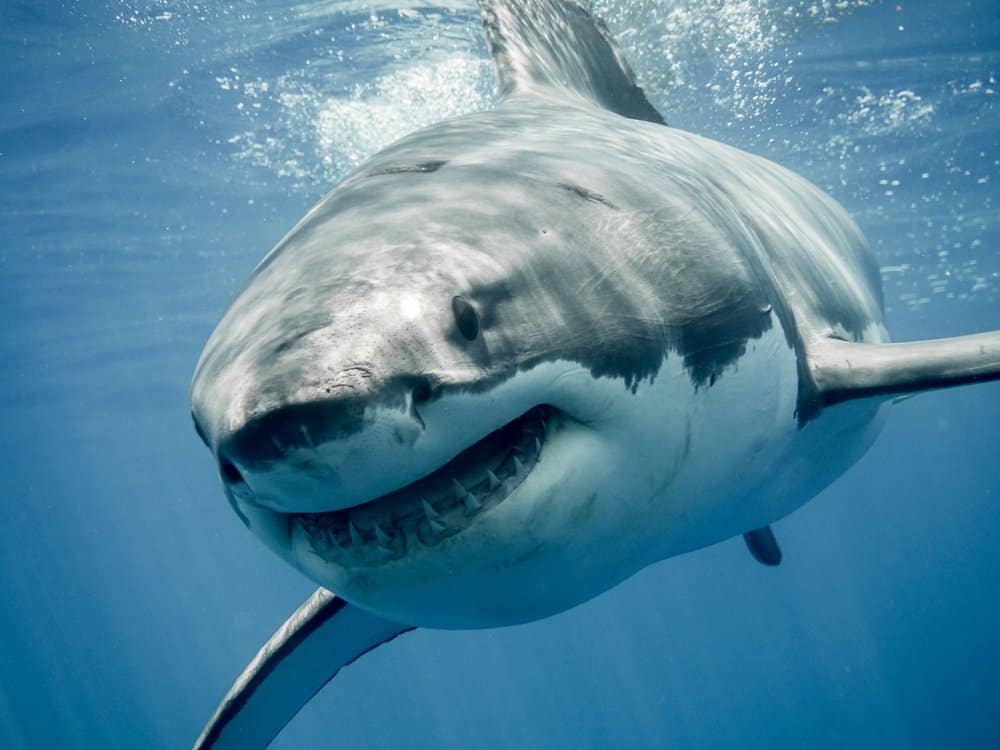
Great white sharks actually existed before dinosaurs.
©Ramon Carretero/Shutterstock.com
There are more than 450 shark species in the world, including the great white shark, known by the scientific name Carcharodon carcharias. They are considered an apex predator, as they are at the top of the food chain in the ocean. It is possible for great white sharks to reach lengths of 20 feet, although most are much smaller. Females average 15-16 feet in length, while males average 11-13 feet.
They may be found in seas all around the world, except for Antarctica. They are primarily found in coastal regions. Even though they are quite intimidating, the great white shark plays a very important role in the ocean’s ecosystem. As such large predators, they keep populations of sea lions and elephant seals at bay. The oceans are balanced when a great white shark is around.
So, how long do great white sharks live? Let’s look at the great white shark’s lifespan and how long they live.
How Long Does a Great White Shark Live?
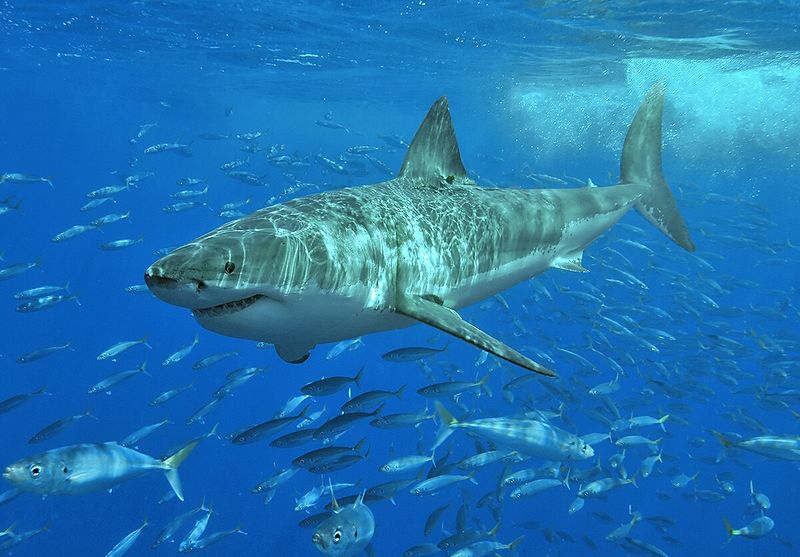
Shark fins are unique and comparable to fingerprints.
©Terry Goss / Creative Commons – Original
So, just how long does a great white shark live? The average lifespan of a great white shark is 40 to 70 years of age. This is a big difference from what scientists originally thought. Until 2014, experts thought that great white sharks only lived for 25 to 30 years.
However, studies conducted by Marine and Freshwater Research determined that white sharks may grow more slowly and live longer than previously thought. The researchers used eight sharks of varied sizes and confirmed yearly age regularity of up to 44 years. This resulted in the conclusion that white sharks in the western North Atlantic Ocean can live for an estimated 73 years.
According to a research article in PLOS One Journal, white sharks may be among the longest-lived chondrichthyan fishes. Chondrichthyan fishes include sharks, skates, stingrays, and chimaeras.
Now that we know that sharks can live just as long as humans, how do they go through their stages of life? Let’s uncover that in more detail.
The Average Great White Shark Life Cycle
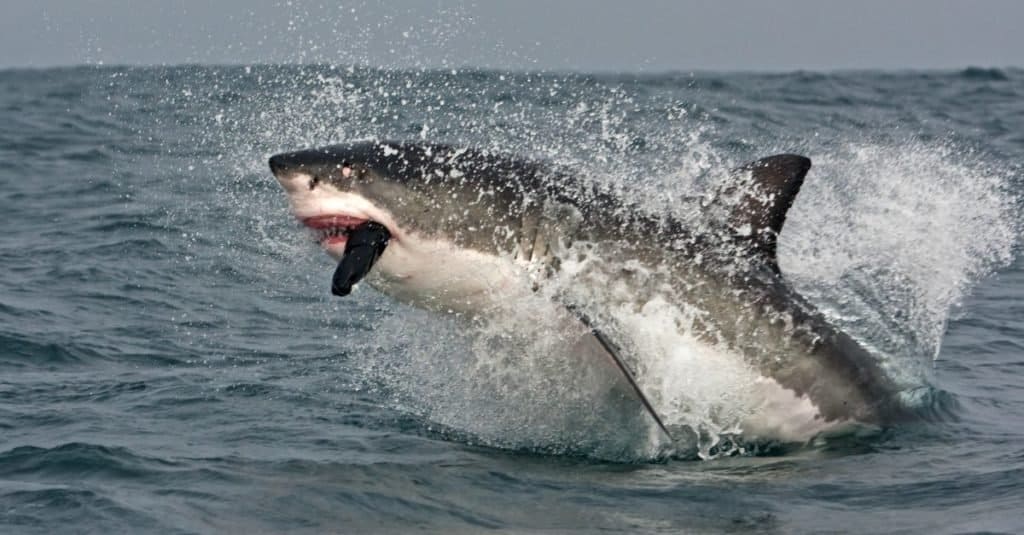
Great white sharks can dive out of the water just like whales.
©Martin Prochazkacz/Shutterstock.com
So how do sharks go from baby to greatly feared predator? Great white sharks are classified into five life phases by scientists: fertilization, incubation and gestation, pups, subadults, and adults. Let’s explore each life stage in detail.
Fertilization
In sharks, fertilization is the starting point of their lives. Mating among sharks is somewhat unknown, with researchers and scientists rarely witnessing it. Internal fertilization of the female egg happens. The male’s pelvic fin is most closely related to a penis in mammalian species and is what is used to fertilize the eggs.
Incubation and Gestation
After fertilization, sharks go through incubation. The majority of sharks lay eggs inside their body. The female shark will remain pregnant for 12-22 months. Interestingly enough, cannibalism occurs in some shark species when the first pup to hatch consumes the rest of the eggs while still within its mother. Oophagy is the term for this behavior.
Pups
A baby shark is called a pup. Many sharks give birth to live young. Female great whites are able to give birth to 2-14 pups at a time. At birth, the pups are 4 to 5 feet long and entirely self-sufficient. It will quickly swim away from its mother and begin hunting for little sea creatures.
Subadults
Sharks are not considered fully grown adults for many years. In fact, a shark might take up to 15 years to fully mature. Most sharks remain close to their birthplace until they reach adulthood. Since growth can take so long, there are many sharks that die before reaching adulthood.
Adults
If a shark makes it into adulthood, that means it can finally reproduce. As adults, sharks will spend most of their time hunting for food. Unlike humans, sharks don’t really sleep either. They can take an occasional nap here and there, but they really only rest more during the colder months. And even then, they only rest for around 10% of their day.
Common Factors That May Negatively Impact the Great White Shark Lifespan
As an apex predator, the great white shark is at the top of the food chain. This means that there isn’t really much in the ocean that can kill them or hunt them down. They only have one natural predator in the ocean, and that is the killer whale. So if you’re curious about what could kill a predator as big and scary as a great white, then read on!
- Killer whales: Orcas, also known as killer whales, are the only natural predator of great white sharks. Recently, there have been government reports that orcas off the coast of South Africa are killing great white sharks and eating their livers. There were at least seven great whites that were found killed.
- Overfishing: Overexploitation of sharks by humans is the biggest killer of great white sharks. Overfishing has become a huge problem, with more than 100 million species of sharks killed per year. The great white shark is no exception to this. Sharks are often caught for their fins for use in shark fin soup, a delicacy in Asia. There is also overfishing for their meat, liver oil, cartilage, leather, and even their teeth.
- Habitat destruction: To survive and hunt prey, all sharks rely on healthy ecosystems. The effects of climate change, pollution, and the loss of regions such as mangroves and reefs all contribute to habitat destruction. These areas are incredibly important for sharks as they use them for hunting and keeping their pups safe.
The photo featured at the top of this post is © iStock.com/Peter_Nile
Thank you for reading! Have some feedback for us? Contact the AZ Animals editorial team.





